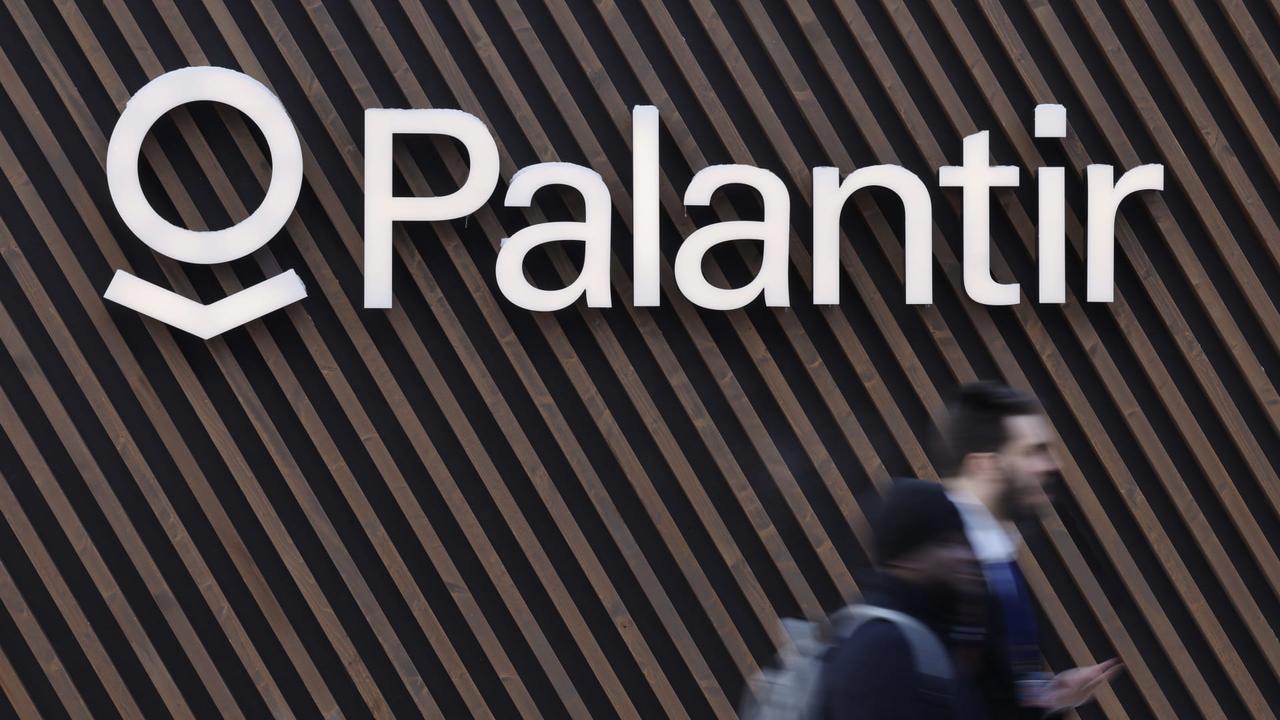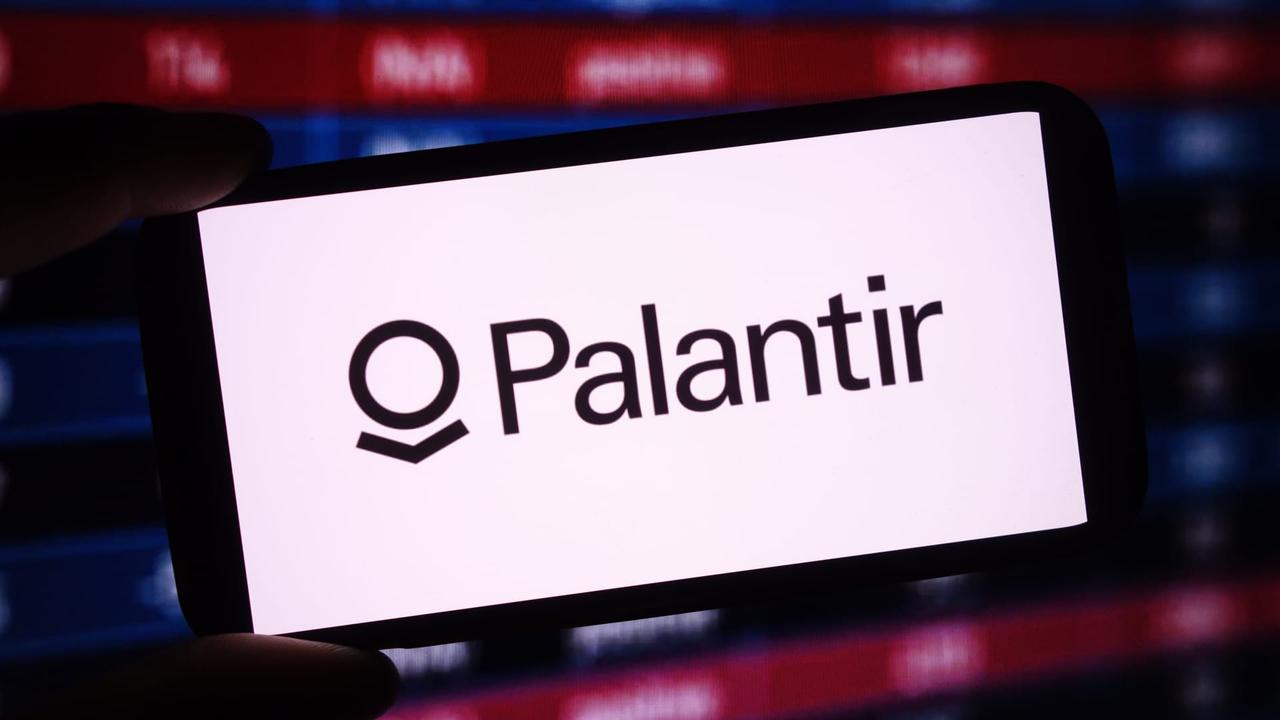Palantir's AI-Driven Growth Faces Market Skepticism Despite Record Earnings
8 Sources
8 Sources
[1]
Palantir Reports Record Quarterly Revenue, Hikes Forecasts
Palantir Technologies Inc. raised its annual revenue outlook to $4.4 billion and outpaced analyst estimates for third-quarter sales, citing "accelerating and otherworldly" growth for its artificial intelligence and data analytics products. Revenue increased 63% to $1.18 billion in the period ended in September, the company said Monday in a statement. Analysts, on average, estimated $1.09 billion. In the current quarter, sales will be about $1.33 billion, compared with an average projection of $1.19 billion.
[2]
Palantir tops estimates, boosts fourth-quarter guidance on AI adoption
Alex Karp, chief executive officer of Palantir Technologies Inc., speaks during the AIPCon conference in Palo Alto, California, US, on March 13, 2025. Palantir reported quarterly results that topped analysts' estimates and issued better-than-expected guidance for the fourth quarter, attributing much of its strength to artificial intelligence. The stock rose about 3% in extended trading. Here's how the company did compared to LSEG estimates Palantir, which builds analytics tools for large companies and government agencies, said it expects revenue of about $1.33 billion for the current period, exceeding the $1.19 billion expected by analysts, according to LSEG. The optimistic guidance comes even as the government shutdown stretches into its second calendar month, and potentially threatens some key contracts. Revenue in Palantir's government business grew 52% in the quarter from a year ago to $486 million. Government sales, particularly from military agencies, have been central to Palantir's ongoing ascent. Over the years, Palantir has steadily beat out major legacy government contractors, and recently landed a deal worth up to $10 billion contract with the U.S. Army. Palantir has also faced criticism over how its tools are being used by government agencies, including U.S. Immigration and Customs Enforcement. Total revenue in the quarter jumped 63% from $725.5 million a year ago, exceeding $1 billion for the second straight quarter. Net income more than tripled to $475.6 million, or 18 cents per share, from $143.5 million, or 6 cents per share, a year earlier. For the full year, Palantir now expects about $4.4 billion in sales, topping the $4.17 billion forecast by Wall Street. The company also bumped up its full-year free cash flow outlook to between $1.9 billion and $2.1 billion. Palantir's commercial business more than doubled to $397 million. Total contract value for commercial deals closed more than quadrupled to $1.31 billion. Over the last few weeks, the company has announced new partnerships with Snowflake, Lumen and Nvidia. Retail investors have helped drive Palantir's skyrocketing stock price to new heights. The shares have surged more than 170% this year, lifting the company's market cap past $490 billion and cementing the company among the most valuable technology names in the world. Analysts have raised concerns about the stock, which trades at an extreme multiple relative to technology behemoths with far more revenue. In a letter to shareholders, CEO Alex Karp called out the "detractors" who have been "left in a kind of deranged and self-destructive befuddlement." "The reality is that Palantir has made it possible for retail investors to achieve rates of return previously limited to the most successful venture capitalists in Palo Alto," he wrote. "And we have done so through authentic and substantive growth."
[3]
A top analyst warned of a 'prisoner's dilemma' and 'AI wobble' in the stock market just days before Palantir seemed to confirm everyone's fears | Fortune
A top market analyst's warning in late October about a looming "prisoner's dilemma" and an "AI wobble" in the stock market became chillingly prescient this week as even bullish earnings from Palantir failed to stop a dramatic tech-led selloff. The remarks came from Tony Yoseloff, managing partner and chief investment officer at Davidson Kempner Capital Management, in conversation with Goldman Sachs' Tony Pasquariello, for the podcast Exchanges: Great Investors, recorded on Oct. 20 and released 11 days later. Yoseloff posed some hypothetical questions about the much-covered question of "circular financing" in the artificial intelligence (AI) space, where the same firms are funding each other that are also selling to each other. "So the way I like to think about it is: Is there going to be an AI wobble at some point? Are investors going to be concerned about how those CapEx dollars are being invested?" Right now, he continued, alluding to a famous game theory scenario, "there's a little bit of a prisoner's dilemma, let's call it, among the larger firms. You have to invest in it because your peers are investing in it, and so if you're left behind you're not going to have the stronger competitive position to it." The investor continued by comparing today's heavy concentration -- where 10 stocks wield 40% of the S&P 500's weight -- to historic bubbles like the "Nifty Fifty" of the early 1970s and the dot-com surge at the millennium. He warned that in those eras, investors waited as long as 15 years just to recover losses after valuations cracked. The foreboding message arrived nearly synonymous with famed investor Michael Burry, best known for profiting from the subprime mortgage collapse, revealing a $1.1 billion short position against major AI bellwethers Nvidia and Palantir in early November. His move sent shockwaves through global markets already jittery about the narrowness of tech gains: Bank of America Research analysts noted the "Magnificent 7" tech stocks contributed more than 80% of the S&P 500's total returns last month, heightening fears of a reversal. Markets responded violently. Palantir shares, having soared 154% year-to-date and surging 7% after its Q3 earnings initially, reversed course and plunged nearly 8% in a single day. Asian and European indices followed suit, highlighting how tightly global sentiment is bound to a handful of AI leaders. In South Korea and Taiwan, for instance, one or two tech stocks accounted for nearly half the national index returns, illustrating Yoseloff's "wobble" risk: Any crack in confidence could bring a swift, severe correction. Palantir CEO Alex Karp was angry and typically outspoken as he appeared on CNBC's "Squawk Box" the next day, when he was asked specifically about Burry's short position. Karp responded that when he hears of short sellers attacking his company, "what I believe is clearly the most important software company in America and therefore in the world," he said "it just is super-triggering, because these people, they could pick on any company in the world. They have to pick on the one that actually helps people, that actually has made money for the average person, that is actually supporting our war fighters." Karp added it's "crazy motivating" and he believes "the short sellers are constantly getting screwed by Palantir." The company's stock was trading down another 2% on Wednesday. To Karp's point about the company's success, Palantir reported a record-setting quarter with $1.18 billion in revenue, besting estimates and boasting U.S. government contracts up 52% over the year. Karp's combative tone on the earnings call, touting his "anti-woke" approach and Palantir's government synergies, did little to calm investor jitters. Analysts voiced concern that even robust sales and guidance "don't justify its valuation" given the scale of capex and the unproven returns from AI-driven bets. To their point, Palantir has a whopping price-to-earnings ratio of more than 100x. Karp brushed aside critics of Palantir's strategic direction, but a closer look at the trading floor suggested his boasts were no match for market structure. Yoseloff's warnings about the prisoner's dilemma -- where tech giants are locked in costly, self-reinforcing arms races, largely because they cannot afford not to invest -- seemed vindicated as even strong results triggered a sell-the-news spiral. Top Wall Street CEOs piled on, with Goldman's David Solomon and Morgan Stanley's Ted Pick both projecting corrections of up to 20% for stock valuations. With both analyst warnings and high-profile action heralding a potential regime shift in markets, the AI sector's "wobble" may only be beginning. As Palantir's swift reversal shows, confidence in continual AI-driven growth is no longer bulletproof. If the "prisoner's dilemma" continues, there is a risk "dead capital" could haunt tech valuations for years to come -- as happened after past bubbles. Yet for seasoned investors like Yoseloff, the period ahead promises not just volatility, but new opportunities, as "absolute return strategies" thrive when markets finally force a separation between true winners and casualties of unmet expectations. In that sense, the fears that Palantir's earnings could not vanquish may yet prove to be the financial world's next big inflection point.
[4]
AI boom shows strain as Palantir slumps and Nasdaq slides
Palantir blew past Wall Street expectations in its third quarter -- raising its full-year guidance and touting triple-digit growth in its U.S. commercial business. Still, the retail-investor and Wall Street darling fell over 7% before the bell on Tuesday, in line with a broader Nasdaq slide. Dan Ives of Wedbush credited a "this is as good as it gets" reaction to results as the reason for the pullback. In a larger sense, as the Wall Street Journal noted, "A note of caution is creeping into markets." Ted Pick, CEO of Morgan Stanley, speaking early Tuesday in Hong Kong, posited that the months-long run-up in major indexes could be making stocks vulnerable -- if enthusiasm lapses, there's nowhere to go but down. CEO Alex Karp credited the company's Artificial Intelligence Platform for "compounding AI leverage" across both its government and corporate clients. Palantir closed a record 204 deals worth at least $1 million, including 53 above $10 million, with total contract value rising 151% to nearly $3 billion. Wedbush analyst Dan Ives called the quarter "another validation moment for AI demand," dubbing Palantir the "Messi of AI." The firm reiterated its Outperform rating and $230 price target. Palantir, Wedbush wrote, remains "at the forefront of the AI revolution." With record profits and still-surging U.S. demand, Palantir is proving it can monetize AI. The question now is whether this boom -- so central to both markets and the broader economy -- can keep compounding without a correction.
[5]
Palantir's CEO Says the Software Maker Is Seeing 'Otherworldly' Growth Driven by AI Demand
The data analytics software maker raised its full-year revenue outlook for the third straight quarter. Palantir posted record quarterly results that blew past analysts' estimates and raised its full-year revenue outlook for the third straight quarter. The AI software company reported adjusted earnings per share of $0.21 cents on revenue that jumped 63% year-over-year to a record $1.18 billion in the third quarter, well above analysts' estimates compiled by Visible Alpha, driven by strong demand for its Artificial Intelligence Platform. While Palantir still derives more of its domestic business from the government than corporations, its commercial segment drove much of the company's growth in the quarter. Palantir's commercial revenue in the U.S. surged 121% to $397 million, compared to a 52% jump in U.S. government revenue to $486 million. CEO Alex Karp called the commercial segment an "absolute juggernaut" in a letter to investors, in which he touted the company's "otherworldly" growth. Looking ahead, Palantir said it sees fourth-quarter revenue of $1.327 billion to $1.331 billion, leading it to raise its full-year revenue outlook to $4.396 billion to $4.4 billion, up from $4.14 billion to $4.15 billion previously, marking the third straight quarter it's hiked its forecast. Shares of Palantir surged over 5% in extended trading shortly following the release, before paring those gains to trade marginally higher. The shares were up over 170% for the year through Monday's close, making it one of the best-performing stocks in the S&P 500 for 2025.
[6]
Palantir's Breakout Quarter Tests the Limits of AI Valuation Power | Investing.com UK
Palantir's (NASDAQ:PLTR) latest quarter pushes the AI narrative back to center stage and raises a sharper question for markets: how far can valuation stretch when both government and commercial demand surge at once. The transmission channel is the high-beta AI software cohort, where capital has rotated aggressively. The opportunity lies in accelerating revenue and widening margins, while the immediate risk is a valuation ceiling if macro liquidity tightens. Palantir delivered revenue of approximately $1.18 billion in the third quarter, rising about 63 percent from a year earlier, and booked net income of roughly $475 million. The company now generates more profit in three months than it earned in revenue only a few years ago, a signal that AI demand is translating into operating leverage rather than hype alone. US government contracts contributed nearly $486 million, expanding about 52 percent year on year, while U.S. commercial sales reached roughly $397 million, more than doubling. That shift matters: Palantir has historically been seen as a government-first software supplier. A business mix moving toward diversified commercial revenue lowers cyclicality tied to procurement cycles and expands its total addressable market. The macro backdrop supports this transition. Fiscal spending remains elevated as Washington prioritizes defense modernization and data infrastructure. Europe is rearming in response to Russia's aggression, and NATO nations are increasing digital defense budgets. Meanwhile, the private sector is racing to integrate enterprise-scale AI as productivity pressures build and capital expenditure cycles move toward data infrastructure. Palantir's recent $100 million IRS award and $400 million State Department contract show federal momentum. Partnerships like the Nvidia tie-up signal deeper participation in the compute-to-software value chain. When firms combine high-performance chips with proprietary data platforms, they accelerate deployment curves and deepen switching costs. Markets responded accordingly. Palantir shares climbed to new all-time highs, adding to gains that have pushed the stock up more than 100 percent this year. The surge boosted AI-linked software peers and contributed to a modest tilt toward growth and momentum factors within the S&P 500. Treasury markets barely flinched, with 2-year yields holding near recent highs and 10-year yields trading within a narrow range. The curve remained slightly inverted, suggesting investors still expect slower growth down the line even as near-term optimism lifts risk assets. The US dollar stayed firm, with the DXY near recent peaks, capping gold near recent consolidation levels around the mid-$2,300s per ounce and limiting upside in cyclical commodities such as copper. Credit spreads tightened marginally as AI enthusiasm supported risk appetite, and equity volatility drifted lower intraday. The bullish case rests on follow-through. Palantir raised full-year revenue guidance to a range of $4.396 billion to $4.4 billion and guided U.S. commercial revenue to more than double to about $1.433 billion. If execution continues, AI adoption accelerates, and public-sector spending remains elevated, the stock's premium could remain intact. A soft-landing backdrop, steady inflation prints, and a Federal Reserve that maintains a cautious but easing bias would reinforce this view. Watch upcoming US inflation data over the next two weeks, fiscal headlines from Washington, and enterprise-IT spending surveys into year-end. Also monitor Q4 guidance season across software names as a sentiment check. The bearish case focuses on valuation. Palantir's market capitalization has reached roughly $491 billion, placing it among the most expensive software names by sales multiple. If Treasury yields push higher on persistent inflation or if liquidity tightens, richly valued AI plays could see sharp multiple compression. Competition in enterprise AI platforms remains intense, and commercial adoption, while fast-growing, could still be lumpy as budgets adjust. Key risk triggers include a hotter-than-expected inflation print, hawkish Fed rhetoric at the next policy meeting, or delays in large federal awards. Near-term, traders leaning short have been squeezed, but positioning can shift quickly if macro tone changes. For investors, the takeaway is disciplined exposure. Palantir's revenue acceleration, margin strength, and diversified demand profile argue for maintaining a core allocation to high-quality AI infrastructure names. The key risk remains valuation sensitivity to rates. A sustained drop in 10-year yields below recent highs would support continued upside, while a renewed spike above prior peaks would warrant trimming. The thesis changes if commercial growth slows or if geopolitical spending retrenches. Until then, momentum sits with execution, and the burden of proof rests on the skeptics who still struggle to reconcile fundamentals with price.
[7]
Palantir exceeds expectations and raises its annual targets thanks to rise of artificial intelligence
Palantir Technologies reported quarterly results that are well above expectations and raised its forecast for the year, buoyed by the growth of its artificial intelligence platform. In Q3, revenue reached $1.18bn, compared with $1.09bn anticipated by analysts, while adjusted EPS came in at 21 cents, exceeding the consensus of 17 cents. The stock was flat after the market closed. Government activity, the company's traditional core business, grew 52% y-o-y to $486m, despite the ongoing partial shutdown of the federal government. Palantir notably signed a major contract with the US military, worth up to $10bn. Growth was even more pronounced in the commercial sector, with revenues doubling to $397m and contracts signed quadrupling to $1.31bn. The company also recently entered into partnerships with Snowflake, Lumen and Nvidia. Overall revenue jumped 63% compared to last year, crossing the $1bn threshold for the second consecutive time. Net income more than tripled to $475.6m, up from $143.5m a year earlier. Palantir now forecasts annual revenue of $4.4bn, up from its previous forecast of $4.17bn, as well as free cash flow of between $1.9bn and $2.1bn. The stock, which is up over 170% since January, brings the company's valuation to over $490bn, raising questions about its valuation. CEO Alex Karp defends this growth, highlighting what he describes as "authentic and substantial" growth.
[8]
Palantir forecasts fourth-quarter revenue above estimates on solid AI demand
(Reuters) -Palantir Technologies forecast fourth-quarter revenue above analysts' estimates on Monday, as the rapid adoption of artificial intelligence boosts demand for its data analytics services from businesses and governments. Shares of the company gained about 2% in extended trading. The defense contractor raised its annual sales target for the third time this year, amid strong sales for its services that ease the transition to the complex, data-intensive technology. Palantir, co-founded by tech billionaire Peter Thiel, expects fourth-quarter sales of between $1.327 billion and $1.331 billion, compared with analysts' average estimate of $1.19 billion, according to data compiled by LSEG. The company also raised its annual sales forecast to a range of $4.396 billion to $4.40 billion, from its earlier expectations of between $4.142 billion and $4.15 billion. Palantir last month announced a deal with Nvidia to use the AI chip leader's processors and software to help its customers speed up decision making in complex fields. It now expects sales to U.S. businesses to exceed $1.43 billion this year, up from the $1.30 billion it forecast earlier. The results come at a crucial moment as big-ticket spending on AI expansion and sky-rocketing market valuations have sparked concerns of an "AI bubble". Palantir's shares have more than doubled in value this year, outpacing the gains in the world's most valuable firm - Nvidia - and the benchmark S&P 500 Index. The stock trades at a whopping 12-month-forward price-to-earnings ratio of 246.2, compared with Wall Street darling Nvidia's 33.3, according to LSEG data. Palantir's results have also been buoyed by expectations of increased defense spending on its military-grade AI tools. The company, initially backed by the CIA, is benefiting from a shift in the Pentagon's software-buying process towards commercial providers under President Donald Trump. Palantir reported revenue of $1.18 billion for the quarter ended September 30, beating estimates of $1.09 billion. Adjusted per share earnings of 21 cents also beat estimates of 17 cents. (Reporting by Arsheeya Bajwa in Bengaluru; Editing by Sriraj Kalluvila)
Share
Share
Copy Link
Palantir reported record quarterly revenue and raised forecasts, citing 'otherworldly' AI-driven growth, but shares declined amid broader concerns about AI market valuations and sustainability.
Record Financial Performance Amid AI Boom
Palantir Technologies delivered exceptional third-quarter results, with revenue surging 63% year-over-year to a record $1.18 billion, significantly exceeding analyst estimates of $1.09 billion
1
. The data analytics company attributed this growth to what CEO Alex Karp described as "accelerating and otherworldly" demand for its artificial intelligence and data analytics products1
.
Source: Bloomberg
Net income more than tripled to $475.6 million, or 18 cents per share, compared to $143.5 million a year earlier
2
. The company raised its full-year revenue outlook to $4.4 billion, marking the third consecutive quarter of upward revisions, and projected fourth-quarter sales of approximately $1.33 billion versus analyst expectations of $1.19 billion5
.Commercial Segment Drives Growth
Palantir's commercial business emerged as a standout performer, with U.S. commercial revenue surging 121% to $397 million
5
. CEO Karp characterized the commercial segment as an "absolute juggernaut" in his letter to investors5
. The company closed a record 204 deals worth at least $1 million, including 53 above $10 million, with total contract value rising 151% to nearly $3 billion4
.
Source: Market Screener
The government business also maintained strong momentum, with revenue growing 52% to $486 million despite ongoing government shutdown concerns
2
. Palantir recently secured a significant contract worth up to $10 billion with the U.S. Army, reinforcing its position among major government contractors2
.Market Skepticism Despite Strong Results
Despite the impressive financial performance, Palantir shares experienced significant volatility, initially rising 3% in extended trading before reversing course and falling nearly 8%
3
. This decline occurred amid broader market concerns about AI sector valuations and sustainability.
Source: Fortune
Market analyst Tony Yoseloff of Davidson Kempner Capital Management had warned of a potential "AI wobble" and "prisoner's dilemma" scenario, where tech companies feel compelled to invest heavily in AI to avoid falling behind competitors
3
. His concerns about circular financing in the AI space, where firms fund and sell to each other, appeared prescient as even strong earnings failed to sustain stock momentum.Related Stories
CEO Response and Valuation Concerns
CEO Alex Karp responded aggressively to market skepticism, particularly addressing short positions taken by prominent investor Michael Burry. In a CNBC appearance, Karp defended Palantir as "clearly the most important software company in America and therefore in the world," expressing frustration with critics targeting a company that "actually helps people" and supports "war fighters"
3
.However, analysts remain concerned about valuation metrics, with Palantir trading at a price-to-earnings ratio exceeding 100x
3
. Despite the company's 170% stock appreciation year-to-date and market capitalization surpassing $490 billion, some analysts question whether current valuations are justified by fundamentals2
.References
Summarized by
Navi
Related Stories
Palantir's Strong Q1 Earnings Fail to Impress Wall Street Amid Valuation Concerns
01 May 2025•Business and Economy

Palantir's earnings surge signals enterprise AI spending boom amid software sector slump
03 Feb 2026•Business and Economy

Palantir's Q2 Revenue Surges to $1 Billion, Fueled by AI Demand
05 Aug 2025•Business and Economy

Recent Highlights
1
ByteDance's Seedance 2.0 AI video generator triggers copyright infringement battle with Hollywood
Policy and Regulation

2
Demis Hassabis predicts AGI in 5-8 years, sees new golden era transforming medicine and science
Technology

3
Nvidia and Meta forge massive chip deal as computing power demands reshape AI infrastructure
Technology





